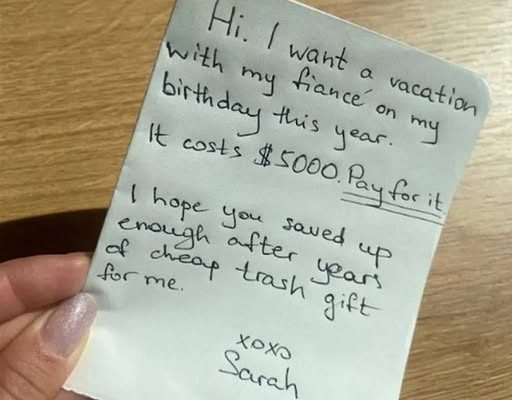We were over the moon when Sarah called to say she was getting married. Jim and I poured coffee, pulled out the old photo albums, and started talking about what we could do to make her day special. We’re not wealthy people, but we’ve always shown up for our granddaughter—rides, tuition help, the down payment for her first car, quilts stitched by hand, and heirloom jewelry passed down with stories folded into the clasp.
Three days later, the mail came.
I slit open an envelope addressed in Sarah’s handwriting and slid out a printed travel quote—$5,000, circled. On top, a note: “I want a vacation with my fiancé for my birthday this year. Pay for it. I hope you saved up enough after years of cheap trash gifts for me.”
I read it twice. My hands shook. When I passed it to Jim, he set it on the table like it might burn a hole through the wood. For a long minute, neither of us spoke. Hurt has a way of making a room very quiet.
“After everything?” I finally managed.
“This is just plain wrong,” he said, sadness flattening his voice.
Under the sting, a small hard thing settled inside me—resolve. “We can’t let this go. She needs to hear no. She needs to hear why.”
We started in the attic. I opened the cedar chest and lifted out the quilts I’d made for her over the years. I ran my fingers over the tiny stitches, remembering the nights I’d stayed up to finish before her birthday. “I thought she cherished these,” I whispered.
“She may, someday,” Jim said, resting a hand on my shoulder. We folded them gently and laid them in a box.
In the guest room, I opened the jewelry box where she used to leave her favorites when she stayed over—the delicate gold necklace that belonged to my mother, the bracelet from her Sweet Sixteen, the locket she wore to prom. I wrapped each piece in tissue, telling myself the stories again so I wouldn’t cry.
We wheeled her childhood bike out of the garage—the one we bought for her tenth birthday, still a good bike under a film of dust. “She used to fly down the street on this thing,” Jim said, half smiling.
Photographs came next. Birthdays, graduations, summers by the lake—her laughing with cake on her face, her in a cap and gown wearing my mother’s necklace, her curled up under one of my quilts on our sofa. We stacked the frames carefully. It felt like loading years into cardboard.
When we were done, Jim called the bank. I called the wedding planner. We withdrew the financial help we’d promised and explained why. There was a startled silence on her end; then a quiet, “I understand.”
We wrote Sarah a letter and read it out loud to make sure we weren’t writing out of anger.
“Dear Sarah,
Your note hurt us deeply. We have given you what we could over the years out of love, not obligation. Demanding money and insulting gifts that came from our hands and hearts shows a lack of respect we cannot ignore. Love isn’t measured in vacations or price tags—it’s measured in how we value the people who show up for us. We hope you’ll take this moment to reflect, to grow, and to remember that gratitude is the foundation of any good life.
Love always,
Grandma and Grandpa.”
The next morning, we loaded the car. The boxes filled the trunk; the bike went on the rack. We drove to the orphanage on the edge of town—the one that always needs blankets, warm things, reminders someone cares. The director met us at the door. When I told her what was inside the boxes, she pressed her lips together and blinked hard.
“These will mean the world,” she said. “Thank you.”
Back home, the phone rang. Sarah’s number.
“How could you do this to me?” she shouted the second I answered. “You’re supposed to love me! You’re ruining my wedding and my life!”
“Sarah,” I said, steadying my voice, “we do love you. That’s why we’re drawing a line. Love isn’t giving in to every demand. It’s guiding the people we love toward being better—kinder, more grateful.”
“You’re cruel!” she snapped, and hung up.
Word traveled, as it does. A cousin called to say we’d gone too far. Another called to say, “You did the right thing. Someone had to say it.”
The house was strangely quiet for a few days, as if it were catching its breath with us. I kept thinking of the quilts wrapped around children who’d never had one, of a little girl climbing onto that bike for the first time, of a teenager fastening my mother’s necklace and standing a little taller in the mirror. Those images hurt and healed in equal measure.
Jim and I sat at the kitchen table where this started—that crumpled travel quote still on the corner like a bad joke—and talked through the second-guessing that sneaks in at night.
“Do you think we were too harsh?” I asked.
“No,” he said, and reached for my hand. “We were honest. That’s the only way anything changes.”
I don’t know how this will end. Maybe Sarah will stay angry. Maybe she’ll come around. We’ll be here either way. Boundaries don’t cancel love; they make room for it to be real. If she calls to talk, we’ll listen. If she apologizes, we’ll forgive. But I won’t pretend that a $5,000 demand and an insult to gifts made with love are normal or acceptable. That’s not the world Jim and I live in, and it’s not the world we want for our granddaughter.
People like to say weddings bring out the best and worst in families. I think they reveal what’s been simmering all along. Entitlement can grow quietly when it’s watered with yeses and overlooked slights. Gratitude grows when it’s named, practiced, expected.
We didn’t do this to punish Sarah. We did it because we believe she can be better than the version of herself who wrote that note. We did it because love sometimes sounds like “no,” and because respect—both given and received—matters more than any honeymoon.
If she learns that now, before vows and a new household, then maybe this will be the best gift we could’ve given her after all.



